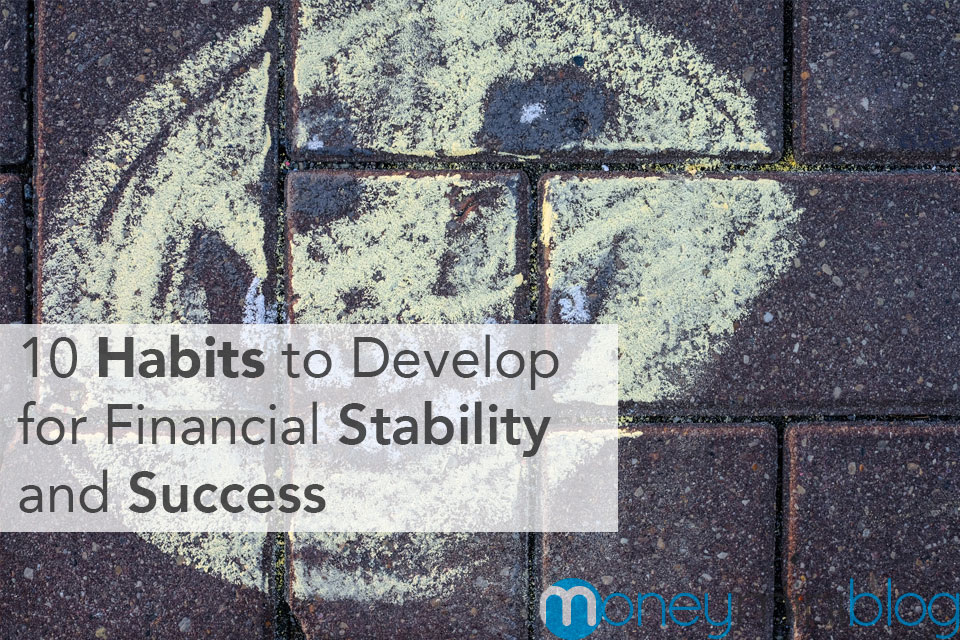
Just like any goal, getting your finances stable and becoming financially successful requires the development of good financial habits.
I’ve been researching this topic extensively in the last few years in my quest to eliminate debt, increase my savings and increase financial security for my family.
I’ll talk more about these habits individually, but wanted to list them in a summary (I know, but I’m a compulsive list-maker).
Here they are, in no particular order:
1. Make savings automagical
This should be your top priority, especially if you don’t have a solid emergency fund yet. Make it the first bill you pay each payday, by having a set amount automatically transferred from your checking account to your savings (try an online savings account). Don’t even think about this transaction — just make sure it happens, each and every payday.
2. Control your impulse spending
The biggest problem for many of us. Impulse spending, on eating out and shopping and online purchases, is a big drain on our finances, the biggest budget breaker for many, and a sure way to be in dire financial straits. See Monitor Your Impulse Spending for more tips.
3. Evaluate your expenses, and live frugally
If you’ve never tracked your expenses, try the One Month Challenge. Then evaluate how you’re spending your money, and see what you can cut out or reduce. Decide if each expense is absolutely necessary, and then eliminate the unnecessary. See How I Save Money for more. Also read 30 ways to save $1 a day.
4. Invest in your future
If you’re young, you probably don’t think about retirement much. But it’s important. Even if you think you can always plan for retirement later, do it now. The growth of your investments over time will be amazing if you start in your 20s. Start by increasing your 401(k) to the maximum of your company’s match, if that’s available to you. After that, the best bet is probably a Roth IRA. Do a little research, but whatever you do, start now!
5. Keep your family secure
The first step is to save for an emergency fund, so that if anything happens, you’ve got the money. If you have a spouse and/or dependents, you should definitely get life insurance and make a will — as soon as possible! Also research other insurance, such as homeowner’s or renter’s insurance.
6. Eliminate and avoid debt
If you’ve got credit cards, personal loans, or other such debt, you need to start a debt elimination plan. List out your debts and arrange them in order from smallest balance at the top two largest at the bottom. Then focus on the debt at the top, putting as much as you can into it, even if it’s just $40-50 extra (more would be better). When that amount is paid off, celebrate! Then take the total amount you were paying (say $70 minimum payment plus the $50 extra for a total of $120) and add that to the minimum payment of the next largest debt. Continue this process, with your extra amount snowballing as you go along, until you pay off all your debts. This could take several years, but it’s a very rewarding process, and very necessary.
7. Use the envelope system
This is a simple system to keep track of how much money you have for spending. Let’s say you set aside three amounts in your budget each payday — one for gas, one for groceries, one for eating out. Withdraw those amounts on payday, and put them in three separate envelopes. That way, you can easily track how much you have left for each of these expenses, and when you run out of money, you know it immediately. You don’t overspend in these categories. If you regularly run out too fast, you may need to rethink your budget.
8. Pay bills immediately, or automagical
One good habit is to pay bills as soon as they come in. Also, as much as possible, try to get your bills to be paid through automatic deduction. For those that can’t, use your banks online check system to make regular automatic payments. This way, all of your regular expenses in your budget are taken care of.
9. Read about personal finances
The more you educate yourself, the better your finances will be.
10. Look to grow your net worth
Do whatever you can to improve your net worth, either by reducing your debt, increasing your savings, or increasing your income, or all of the above. Look for new ways to make money, or to get paid more for what you do. Over the course of months, if you calculate your net worth each month, you’ll see it grow. And that feels great.